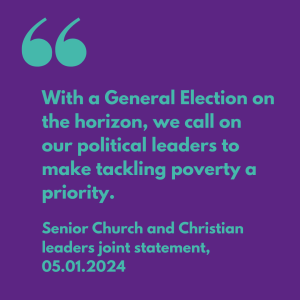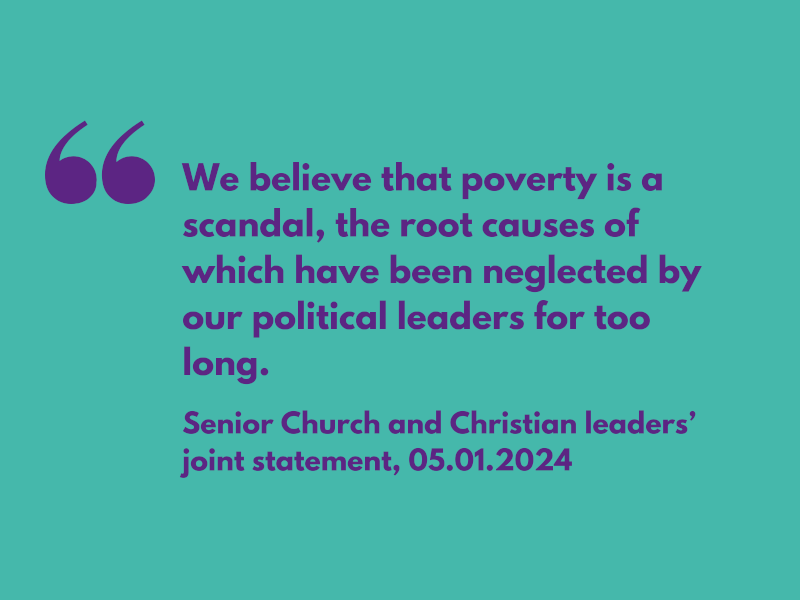Senior leaders from churches and charities, including the United Reformed Church, have called on politicians to take urgent action on rising poverty in the UK and around the world.
In a joint statement released on Friday, January 5, senior Christian leaders – including the General Secretary of Churches Together in England, President and Vice-President of the Methodist Conference and senior leaders of development agencies Christian Aid, CAFOD and Tearfund – have said ‘the human cost of failing to take action now is too big and too damaging to ignore’.
The statement goes on to say poverty is ‘a consequence of political choices and priorities’, and with a General Election on the horizon, ‘this year must mark the beginning of the end for poverty’.
Signatories are calling on political leaders to set out clear plans to eradicate extreme poverty and halve overall poverty by 2030, in the UK and globally.
Patrick Watt, CEO of Christian Aid, is among the signatories. He said: “For millions of people this new year has been marked by poverty and desperation. Regardless of the causes of poverty, and whether it’s hitting people internationally or in the UK, the effects are strikingly similar. Partners and churches describe its crushing effect on people’s dignity and life chances, and its damage to the social fabric. The choices we make collectively about how to tackle poverty, both domestically and internationally, matter. As we approach a General Election, we’re hearing far too little from political parties about their ambition to end poverty, and build the common good. We must not let another year slip by while poverty rises. That’s why we’re coming together at this moment, to call for urgent action to address the causes of poverty, here and around the world.”
The statement is a clear demonstration of solidarity between agencies and churches working to tackle poverty globally and in the UK.
 Revd Gill Newton, President of the Methodist Conference, said: “Poverty around the world may look different in its material and social consequences. But what remains the same is the indignity, fear and isolation it causes for individuals, families and communities, wherever they are. As Christians, our commitment to tackle poverty alongside our global neighbours or within our local communities here in the UK is not in competition – we’re not prepared to pit one against the other in a game of political or economic tactics. Our political leaders must not be either. We need to see more ambition, commitment and practical action to tackle poverty wherever it exists as we approach the next General Election.”
Revd Gill Newton, President of the Methodist Conference, said: “Poverty around the world may look different in its material and social consequences. But what remains the same is the indignity, fear and isolation it causes for individuals, families and communities, wherever they are. As Christians, our commitment to tackle poverty alongside our global neighbours or within our local communities here in the UK is not in competition – we’re not prepared to pit one against the other in a game of political or economic tactics. Our political leaders must not be either. We need to see more ambition, commitment and practical action to tackle poverty wherever it exists as we approach the next General Election.”
In the statement, the churches and charities also signal their intention to work together throughout 2024 to mobilise church members to ‘put poverty on the agenda through practical action, prophetic words and courageous campaigning.’
Get Involved
As part of this, Christian Aid, the Trussell Trust, Church Action on Poverty and the Joint Public Issues Team of the Baptist, Methodist and United Reformed Churches have released ‘Act on Poverty’ – a six-week resource for church groups to explore the impacts of poverty around the world and in the UK and take action ahead of the General Election. Designed for use during Lent or later in 2024, the resource brings campaigners from the UK and global contexts into dialogue about the differences and similarities between their visions for an end to poverty where they are.
Bishop Mike Royal, General Secretary of Churches Together in England, said: “We want to see action on poverty now, and political leaders need to know our ambition for change. I encourage church communities to come together and share with election candidates why tackling poverty should be a priority.”
Stef Benstead, who contributed to the Act on Poverty resource, said: “We know that it is politically possible to end poverty in any society. God told his people that if they followed the laws he gave them for running their country, there would be no poor people among them. That was a time without major technological advancement, yet it was still held to be possible for everyone to have a stable home and sufficient means to access food, clothing, other essentials, and social participation. According to the prophets, poverty occurred because there was injustice and a failure by the leaders of the country to enact policies that guaranteed a minimum living standard for everyone. Christians across the UK and the world should have the confidence to call on our leaders, in the name of God, to act now to end poverty.”
The full statement:
We believe that poverty is a scandal, the root causes of which have been neglected by our political leaders in the UK Parliament for too long. As this new year begins, the cost of living scandal is clearly not over for the poorest people in the UK. Around the world, poverty holds too many individuals and communities back from fulfilling their potential.
But we know that poverty is not inevitable – it’s a consequence of political choices and priorities. With a General Election on the horizon, we call on our political leaders to make tackling poverty a priority. In line with our existing commitment to the UN Sustainable Development Goals, this should include setting out clear plans to eradicate extreme poverty and reduce overall poverty by at least half, in both the UK and globally by 2030.
Whilst our work to tackle poverty in the UK and around the world takes different forms, we are united in our belief that the human cost of failing to take action now is too big and too damaging to ignore. This year must mark the beginning of the end for poverty.
Inspired by our faith, we believe in a future where everyone has an equal share in the world’s resources. Where everyone has enough to eat. Where all of us are able to wake up in the morning with hope, opportunities and options for living a fulfilling life.
This year, our Churches and Christian charities are committed to putting poverty on the agenda through practical action, prophetic words and courageous campaigning. Our elected politicians need to take responsibility too. Now is the time for action.
Signed by:
Christine Allen, Executive Director of CAFOD
Bishop John Arnold, Bishop of Salford
Niall Cooper, Director of Church Action on Poverty
Revd Lynn Green, General Secretary, The Baptist Union of Great Britain
Nigel Harris, CEO of Tearfund
Revd Dr Tessa Henry-Robinson, Moderator of General Assembly, United Reformed Church
Emma Jackson, Public Life and Social Justice Group Convener, The Church of Scotland
Revd Gill Newton and Kerry Scarlett, President and Vice-President of the Methodist Conference
Kate Nightingale, Deputy CEO, St Vincent de Paul Society
Commissioners Jenine and Paul Main, Territorial Leaders, The Salvation Army UK and Ireland
Stewart McCulloch, Chief Executive of Christians Against Poverty UK
Paul Parker, Recording Clerk, Quakers in Britain
Bishop Mike Royal, General Secretary, Churches Together in England
Right Revd Mary Stallard, Bishop of Llandaff
Most Revd Mark Strange, Bishop of Moray, Ross and Caithness, and Primus of the Scottish Episcopal Church.
Patrick Watt, CEO, Christian Aid

